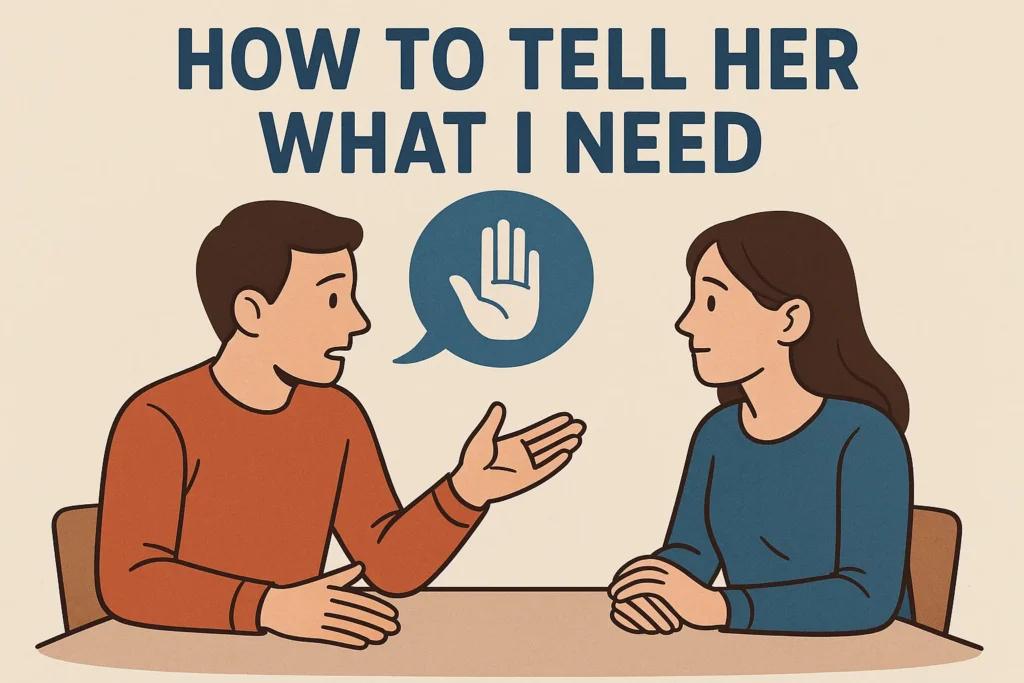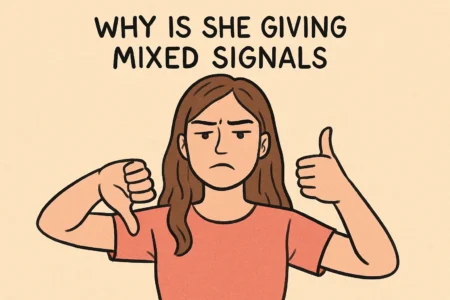It’s sitting right there on the tip of your tongue. A need. A feeling. A line you have to draw. You’ve run the words through your mind a hundred times, searching for that perfect, gentle combination. You think you’ve found it. You take a breath, you walk in, and you say the thing.
And the air changes.
Instantly, you see it in her posture, in the hard set of her jaw. The space between you, once warm, is suddenly thick with a tension you were trying so hard to avoid. What was supposed to be a conversation is now a conflict. Now you’re not just talking about your need; you’re managing hurt feelings, dodging defensive walls, and trying to untangle a massive misunderstanding. If that scene feels painfully familiar, you’ve probably asked the big question: how to tell her what I need without everything catching on fire?
It can feel like a fool’s errand. You’re told communication is key, but every time you turn that key, the lock seems to jam. You end up feeling unheard, frustrated, and maybe even a little angry. It’s enough to make you think, “Why even bother?” I truly get it.
As a woman, I’ve been on both sides of this conversation. I’ve had to learn how to hear my partner’s needs, and I’ve struggled to express my own. I can promise you, there are no magic words. This isn’t about manipulating or “handling” her. It’s about connection. It’s about learning the right approach, picking the right moment, and building a bridge instead of starting a battle. And you can absolutely learn how to do it.
More in Relationship Health Category
How To Get Her To Trust Me Again
Why Is She Giving Mixed Signals
Key Takeaways
- Your Vibe Speaks Volumes: How you say something—your tone, your timing, the look on your face—often matters more than the words themselves. The first step is to choose a calm moment.
- Own Your Feelings with “I” Statements: Start sentences with “I feel” instead of “You did.” This makes it an expression of your experience, not an accusation of her actions.
- Get Specific, Get Actionable: “I need more help” is a vague complaint that’s hard to solve. “Could you handle bath time for the kids tonight?” is a specific request she can actually act on.
- Your Turn to Listen: After you speak, your most important job is to zip it and listen. Hear her out. Validate her feelings, even if you disagree. This has to be a two-way street.
- Practice Makes Progress, Not Perfection: You’re learning a new skill, and you’ll mess up. So will she. The goal isn’t a perfect conversation every time; it’s about getting better at connecting, one attempt at a time.
Why Does She Get Upset When I Just Say What I’m Thinking?
This is the real head-scratcher, right? In your mind, you’re just being straight up. You’re pointing out a fact or stating what you need, so why does it land like a punch? The problem is the canyon between what you mean and what she hears. Your intent might be a simple observation: “The kitchen is a mess.” But the impact on her might be the sound of criticism: “You’re not doing a good enough job.”
That gap is where communication goes to die. And her reaction today probably isn’t just about today. It’s layered with the ghosts of conversations past—last week, last month, last year. It’s a messy mix of your words, your shared history, and all the feelings that have gone unspoken between you.
Is It Really About the Words I’m Using?
Yes, but they’re only half the story. The words are the lyrics, but your tone of voice and your body language are the music. And the music is what she’ll feel in her bones. If the melody is tense, angry, or dismissive, it doesn’t matter how beautifully crafted the lyrics are. She’s going to react to the harsh sound, not the words.
You can say, “Sure, I’ll take care of it,” but if those words are paired with a heavy sigh and an eye-roll, the message she receives is, “You are an annoying burden.” It’s a gut-level thing. Before you open your mouth, check in with yourself. Are you angry? Resentful? Tired? Because whatever you’re feeling will leak out, and that emotion is what she’ll be responding to.
Could Past Arguments Be Bleeding Into This One?
You better believe it. Relationships hold onto everything. Old hurts and unresolved fights don’t just evaporate; they go into storage, waiting for something to jog them loose. That’s why a simple comment about taking out the trash can erupt into a massive fight. It’s not about the garbage. It’s about a deeper pattern—of feeling unappreciated, of feeling like the workload is unfair, of feeling ignored. Her reaction might seem way over the top, but she’s likely reacting to the whole pattern, not the single event.
I remember once losing my mind when my partner was 15 minutes late for dinner. Just 15 minutes. But my reaction was a 10/10 explosion. Why? Because it wasn’t about the time. It tapped into a deep-seated story in my head that my time wasn’t valuable to him. His one small action felt like more evidence confirming my biggest fear. We weren’t fighting about him being late; we were fighting about my need to feel like a priority. Until we dug down to that root, every late arrival was destined to start the same fight.
Before You Even Speak, What’s the Foundation Look Like?
Trying to have a hard conversation in a tense relationship is like trying to build a house in a hurricane. Your plans can be perfect, your materials top-notch, but the environment is just too hostile. You’re doomed from the start. If the daily emotional weather between you is stormy—full of resentment, criticism, or just plain distance—you can’t expect a delicate talk to go smoothly.
You have to work on the foundation first. This means creating a climate of safety and trust day in and day out. Communication isn’t a scheduled event. It’s the sum total of all the tiny little moments—the good mornings, the thank yous, the inside jokes, the quick hugs. That’s the real work.
Are We Building on Solid Ground or Quicksand?
Dr. John Gottman, a giant in relationship research, calls this the “emotional bank account.” Every time you have a positive interaction, you’re making a deposit. A genuine compliment, a shared laugh, a moment of support—those are all deposits. Every negative one—a sarcastic jab, a moment of defensiveness—is a withdrawal. When you have a healthy balance, you can afford the withdrawal of a tough conversation. But if your account is already in the negative, any attempt to talk about a need will feel like another massive withdrawal, sending you deeper into debt.
This means you have to be making deposits all the time, not just when you’re about to ask for something. When was the last time you told her you appreciated something specific she did? Or gave her a compliment just because? These small, consistent actions build a huge reservoir of goodwill. They create the safety that allows her to hear your needs without feeling like she’s under attack.
Am I Picking the Right Time and Place for This Talk?
It’s so basic, but it’s the trap everyone falls into. The right words at the wrong time are the wrong words. Period. Ambushing her with a heavy topic the second she walks in the door from a brutal day at work is setting yourself up to fail. Dropping it on her when she’s stressed, hungry, or trying to get the kids to bed is just asking for a fight. Her defenses are up, and her ability to be generous and open is at an all-time low.
I learned this the hard way. I used to be famous for needing to talk right now. My partner would walk in, still carrying the weight of his workday, and I’d hit him with a “We need to talk about the credit card bill.” It was a disaster every single time. He was still in transition mode, not receiving mode. We finally agreed on a simple rule: no serious talks for the first 30 minutes after getting home. It was a game-changer. That buffer gave us both a chance to breathe, to shift gears, and to actually be present for each other.
So, How Do I Actually Phrase What I Need to Say?
Alright, you’ve checked the emotional forecast, you’ve picked a calm moment. Now, the main event: the words themselves. This is where you can shift the entire dynamic from a confrontation to a collaboration. The goal is to open a window into your world so she can see what’s going on, not to throw a rock through hers.
This means you have to consciously move away from the language of blame. It’s all about owning your experience. This isn’t about being weak or indirect. It’s actually a cleaner, more powerful way to be honest. You’re just being direct about what’s true for you.
What Are “I Feel” Statements, and Do They Actually Work?
They work like magic, but only if you do them right. A real “I feel” statement isn’t just tacking those words onto the front of a complaint. It’s a specific formula designed to remove blame and get to the heart of the matter.
It goes like this: “I feel [your emotion] when [a specific, factual behavior] because [how it affects you]. What I would love is [a clear, positive request].”
Here’s why it’s so powerful:
- “I feel…”: You’re talking about your emotion. This is your truth. It’s impossible to argue with. “I feel lonely” is a fact; “You ignore me” is a debatable accusation.
- “…when…”: You connect your feeling to a concrete action, not a personality flaw. “When we both look at our phones all night” is an observable fact. “When you’re being distant” is a judgment that will make her defensive.
- “…because…”: This is the bridge that helps her understand. You’re explaining the “why.” “…because it makes me feel like we’re just roommates, not partners.”
- “What I would love is…”: You end with a solution! You’re not just dumping a problem in her lap; you’re showing her the way forward. “…if we could put our phones away for an hour after dinner.”
How Can I Be Specific Without Sounding Demanding?
Vagueness is the enemy of progress. “I need you to be more affectionate” is a recipe for frustration. What does that even mean? More hugs? More compliments? More sex? She can’t read your mind, and a vague demand will just make her feel like she’s failing a test she doesn’t have the questions to.
The secret is to frame your specific request as a team effort. You’re inviting her to help you solve a problem together.
Check out the difference:
- Vague: “You never help around the house.”
- Specific: “I’m getting totally swamped by the housework. It would be a huge help to me if you could take over the kids’ bath time on weeknights. What do you think?”
- Vague: “We never do anything fun.”
- Specific: “I really miss just having fun with you. How would you feel about us planning a real date night for this Saturday?”
- Vague: “You’re always on your phone.”
- Specific: “Hey, I feel like I’m competing with your phone for your attention sometimes. Would you be open to a ‘no phones at the dinner table’ rule so we can actually talk?”
The specific requests are clear, positive, and doable. You’re giving her a blueprint for how to succeed, which makes it way more likely she’ll want to help.
Is It Okay to Talk About How Her Actions Affect Me?
It’s not just okay; it’s essential. But you have to separate the impact of her actions from her intent. This is huge. You have to start from the belief that your partner is not your enemy and is not actively trying to hurt you. If you think she is, that’s a much deeper issue.
When you assume she has good intentions, you can talk about a behavior without attacking her as a person. Her action had a negative impact on you, but that doesn’t make her a bad person. It’s the difference between saying, “It was so selfish of you to make plans without me,” and saying, “When I found out you made plans for the weekend without talking to me, I felt really hurt because it made me feel left out.”
The first one is a character assassination. The second one is a report from your heart. It gives her the space to understand your experience without having to defend herself. She can respond with, “Oh, wow, I’m so sorry. I honestly didn’t think of it that way. I was just trying to get it locked in before the tickets sold out.” Now you have a problem to solve together (how to coordinate better), not a fight about whether she’s a selfish person.
What Happens After I’ve Said My Piece?
You did it. You found the right time, you used the right words, and you put your need out there. Big exhale. But don’t relax just yet. The most critical part of the conversation is just beginning. What you do now—how you receive her reaction—is what will ultimately decide if this conversation builds a bridge or a wall.
It’s her turn. She has her own set of feelings, her own story about what happened, and her own needs. If you shut that down or dismiss it, you’ve just undone all the good work you did.
She’s Talking Now… What’s My Job?
To listen. And I don’t just mean being quiet while you reload for your next point. I mean active listening, which is a full-body sport. It means putting your own argument on a shelf for a minute and making it your sole mission to understand her world from the inside out.
First, play it back to her. Use phrases like, “Okay, so let me see if I’ve got this. It sounds like you’re feeling…” This proves you’re actually listening and gives her a chance to correct you if you’ve misunderstood. Second, validate her feelings. This is the superpower. Validation doesn’t mean you agree. It just means you acknowledge her feelings are real for her. “I can see why you’d feel that way.” Or “That makes sense.” Those few words can pour water on a raging fire.
What if She Still Gets Defensive?
Sometimes, even with the most perfect approach, she’ll still throw up a wall. That’s just human. Maybe your need poked one of her old wounds or hit an insecurity. The absolute worst thing you can do now is get defensive right back. That’s how you get a full-blown war. Your job is to be the calm, steady anchor.
Don’t bite. Breathe. And try to listen for the feeling underneath the defensiveness. Is she feeling accused? Unappreciated? Afraid? Speak to that. “I can see this has really upset you, and that was the last thing I wanted. I’m not trying to attack you at all. I’m trying to get closer to you.”
I had to pull this move recently. I was trying to talk about household chores—always a fun topic. I used all my best “I” statements, but my partner still heard it as, “You don’t do enough.” He immediately started listing all the things he does do.
My knee-jerk reaction was to fire back with my own list. But I stopped myself. I took a breath and said, “Hey. This isn’t a competition. I know how much you do, and I appreciate it. This isn’t about keeping score. It’s about me feeling like we’re a team against the chaos. How can we make it feel more like we’re on the same side?” The tension just melted out of the room. We went from being opponents to being partners trying to solve a puzzle.
Are There Any Traps I Should Absolutely Avoid?
Just as there are smart moves, there are also conversational landmines that will blow up in your face almost every time. We usually step on them out of habit, not because we’re trying to cause trouble. But the damage is the same. Learning to spot these traps is the first step to walking around them.
Why is Bringing Up the Past Such a Bad Idea?
This is called “kitchen-sinking.” The argument starts about the dishes in the sink, and suddenly you’re throwing in every grievance from the last five years, right down to the kitchen sink. That thing she said at your cousin’s wedding? In it goes. The time she forgot your anniversary? Throw that in, too.
This is a conversation killer. It makes the problem feel impossibly huge and unsolvable, and it drags you completely off-topic. You can’t fix five years of hurt in one conversation. Stick to the here and now. If you have old wounds that need attention, give them their own dedicated time. Don’t let them poison this one.
What’s the Difference Between a Need and a Criticism?
This line is fine, but it’s the most important one to see. A need is about you. A criticism is about her. Learning to state your needs without them sounding like an attack on her character is everything.
Let’s do a reframe:
- Criticism: “You are such a slob.”
- Need: “I have a really hard time relaxing when the house is cluttered. I need us to find a way to keep this space feeling calm.”
- Criticism: “You never open up to me. You’re like a robot.”
- Need: “I feel closest to you when I have a window into your world. I would love to hear more about what’s on your mind.”
- Criticism: “You are so bad with money.”
- Need: “I get a knot in my stomach when I think about our finances. I need us to feel like a team on this, so I’d love for us to make a budget together.”
Should I Ever Say “You Always” or “You Never”?
No. Just don’t. These words are like lighting a match next to a gas can. They are absolute statements, and they are almost never true. The second you say, “You always leave your socks on the floor,” her brain will immediately go on a search-and-destroy mission for the one time she picked them up. She’ll find it, and she’ll come back with, “No, I don’t! I picked them up last Tuesday!”
And just like that, you’re no longer talking about socks. You’re in a ridiculous courtroom drama debating the factual accuracy of the word “always.” These words are lazy and inflammatory. They turn a fixable behavior into a permanent personality defect. Be specific. “I felt frustrated when I saw your socks on the floor this morning” is a problem you can solve. “You always leave your socks on the floor” is an insult.
Conclusion
Learning how to tell her what I need without a fight isn’t about finding some secret code that guarantees she’ll never be upset. She’s a person. She gets to have her feelings, just like you do. The real win is learning to express yourself in a way that invites her to be your partner, not your opponent. It’s about building a relationship where you both feel safe enough to be honest, brave enough to be vulnerable, and loving enough to truly listen.
This isn’t a quick fix; it’s a practice. You’re building a muscle together, one conversation at a time. Sometimes you’ll nail it. Other times, you’ll fall back into old, bad habits. That’s part of it. The key is to stay in the ring, to keep trying, and to remember that the point isn’t to win the argument. The point is to strengthen the connection. When you can do that, you’ve already won.
FAQ – How To Tell Her What I Need
How can I communicate my needs to my partner without causing conflict?
To communicate your needs effectively, choose a calm moment and use ‘I’ statements to express your feelings, be specific in your requests, and listen actively to her response, ensuring the conversation is collaborative rather than confrontational.
Why does my straightforward expression of needs often lead to her getting upset?
Her reaction is often due to the gap between your intent and her perception; tone, body language, past experiences, and unresolved issues can make simple statements feel like criticisms, triggering defensiveness.
What is the importance of timing and setting when discussing needs?
Having important conversations in a calm, non-stressed environment, ideally after creating a foundation of trust and safety, increases the likelihood of a productive and positive exchange rather than a conflict.
How should I phrase my needs to avoid sounding demanding?
Frame your requests as team efforts by being specific, positive, and collaborative, such as proposing a shared solution rather than making vague or accusatory statements.
What is the key to listening effectively after sharing my needs?
Active listening, which involves fully focusing on her, validating her feelings, and reflecting back what she says, helps deepen understanding and keeps the conversation constructive, even if she reacts defensively.





